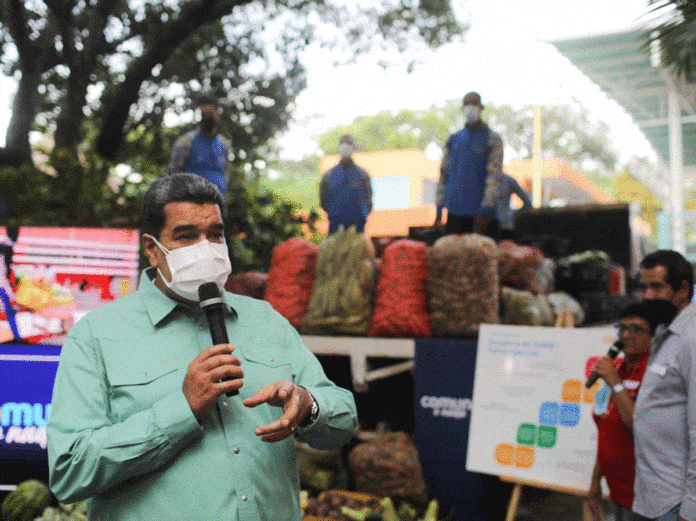
Venezuelan president Nicolas Maduro speaking at the 23 de Enero barrio in Caracas about food production. Photo: Presidential Press.

Orinoco Tribune – News and opinion pieces about Venezuela and beyond
From Venezuela and made by Venezuelan Chavistas

Venezuelan president Nicolas Maduro speaking at the 23 de Enero barrio in Caracas about food production. Photo: Presidential Press.
Venezuela meets its demand with national production, said the president.
From the 23 de Enero parish in Caracas, the President of Venezuela, Nicolás Maduro, said that Venezuela is at the forefront of food production.
At the Robinsoniana Commercial Technical School in Caracas, Manuel Palacio Fajardo, the school’s president, said that through the union of communities and peasant producers, rentierism and the dependency on imports by companies is being eliminated.
RELATED CONTENT: Hunger and Food Production in Nicaragua: How do we Feed the People?
“Before, $600 million was spent annually to import potato seeds, now the Venezuelan state meets the demand for this item with national production,” said Nicolás Maduro. He toured the process of cultivation by organized communities for domestic agriculture in the 23 de Enero parish.
Likewise, President Maduro learned first-hand about the execution of the theory of the double-participation ladder, a program to exchange the work of producers with communities to eliminate food dependency.
“We must promote the communal economy of the country,” said the president, and recalled that the People’s Power has promoted the communal economy over the last four years.
RELATED CONTENT: Venezuela Assigns Land for Food Production on CLAP’s Fifth Anniversary
“Up to now we have 49,178 Communal Councils, 3,640 communes, and 40,640 productive organizations,” he said.
Likewise, he reported that there are 309 communal cities with 13.6 million inhabitants, 1,650 linked communes, and 16,000 communal councils.
President Maduro noted that Zulia, Miranda and Lara are the states with the most registered communal organizations.
“These are convincing data that the community Revolution created by Commander Chávez is in good health,” he said.
Featured image: Venezuelan president Nicolás Maduro speaking at the 23 de Enero neighborhood in Caracas about food production. Photo: Presidential Press.
(Últimas Noticias) by Narkys Blanco
Translation: Orinoco Tribune
OT/JRE/SL/EF